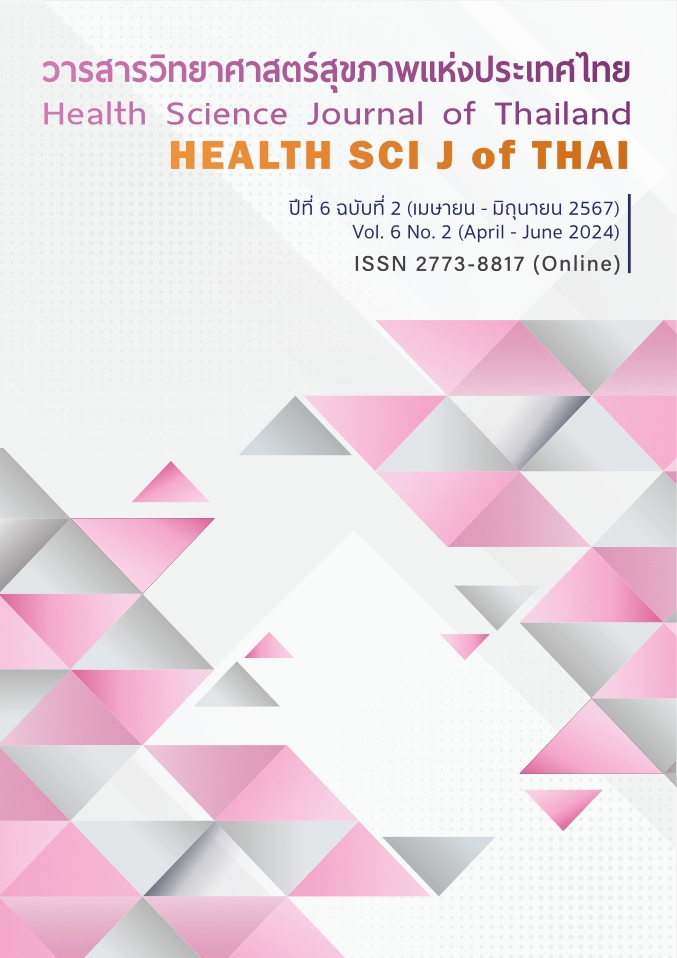Factors Influencing Nursing Management in the COVID-19 Situation of Nursing Administrators in University Hospitals, Northeastern of Thailand
Main Article Content
Abstract
This predictive research aimed to determine the level of nursing administration and factors influencing nursing administration in the situation of the COVID-19 epidemic among 122 nursing administrators who were head nurses or in higher positions at university hospitals in the northeast of Thailand. The research tools consisted of a questionnaire on environmental factors in work and a questionnaire on nursing management in the situation of the COVID-19 pandemic. The content validity values of the questionnaire were 0.96 and 0.98. The reliability values were verified by Cronbach’s alpha coefficient, which were 0.93 and 0.92. Data was analyzed by descriptive statistics and stepwise multiple regression analysis. The results showed the average score of nursing administrators in the situation of the COVID-19 pandemic of nursing administrators at university hospitals in the northeast of Thailand was at a high level. The COVID-19 pandemic situation was divided into 3 phases, including nursing management before, during, and after the COVID-19 pandemic, which had a high level in all 3 phases. In addition, the environmental factors in the work, consisting of the role perception of nursing administrator and the service support system, could jointly predict the variance of nursing administration in the situation of COVID-19 with a statistical significance of 82.50% (R2 = 0.825, p-value <0.05).
Article Details

This work is licensed under a Creative Commons Attribution-NonCommercial-NoDerivatives 4.0 International License.
References
Update the latest number of people infected with the COVID-19 virus around the world (COVID-19) [Internet]. True. 2022 [cited 2022 Feb 9]. Available from: https://kku.world/drhj3 (In Thai)
COVID-19 Medical Innovation and Research and Development Operations Center. Coronavirus Disease 2019 (COVID-19) situation report: update 22 February 2022 [Internet]. 2022 [cited 2022 Sep 2]. Available from: https://kku.world/plx7m (In Thai)
Belghith NBH, Arayavechkit T. Impact of COVID-19 per household in Thailand: insights from the phone accelerator survey [Internet]. 2021 [cited 2022 Mar 20]. Available from: https://kku.world/dk8vr (In Thai)
Nursing Department, Maharaj Nakorn Chiang Mai Hospital. Innovations in Nursing to Manage the Situation of Coronavirus Disease 2019 (COVID 19) under the nursing profession Nursing Department Maharaj Nakorn Chiang Mai Hospital. Chiang Mai: The Hospital; 2020. (In Thai)
Sathira-ankur T, Yonchoho N, Jamsomboon K, Srisuthisak S. Handbook of nursing management in the situation of the COVID-19 outbreak. Nonthaburi: Health Technical, Ministry of Public Health; 2021. (In Thai)
Panyavoodso N, Thiangchanya P, Chukumnerd P. Professional nurses’ experiences of safety participation during the crisis of COVIE –19 pandemic, Hat Yai hospital, Thailand. Christian University Journal 2022; 28(1): 59–72. (In Thai)
Lapuang S. Management during the COVID-19 screening measure for pandemic in Pathum Thani Hospital. [Internet]. 2019 [cited 2022 Feb 10]. Available from: https://kku.world/jpx8r (In Thai)
Green SB. How many subjects does it take to do a regression analysis. Multivariate Behav Res 1991; 26(3): 499–510.
Israel GD. Sampling the evidence of extension program impact. Gainesville (FL): Program Evaluation and Organizational Development, IFAS, University of Florida; 2019.
McCormick EJ, Ilgen DR, McCormick EJ. Industrial and organizational psychology. 8th ed. Englewood Cliffs (N.J): Prentice-Hall; 1985.
Kanasoot P. Statistics for behavioral science research. 3rd rev. ed. Bangkok: Chulalongkorn University Press; 1999. (In Thai)
Cohen J. Statistical power analysis for the behavioral sciences. 2nd ed. Hillsdale (NJ): Lawrence Erlbaum Associates; 1988.
Chinpukdee S. Development of care and nursing models for COVID-19 patients in home quarantine at Kae Dam district. Academic Journal of Nursing and Health Science 2022; 2(2): 6–21. (In Thai)
Afshari D, Nourollahi-darabad M, Chinisaz N. Demographic predictors of resilience among nurses during the COVID-19 pandemic. Work 2021; 68(2): 297–303.
Raso R, Fitzpatrick JJ, Masick K, Giordano-Mulligan M, Sweeney CD. Perceptions of authentic nurse leadership and work environment and the pandemic impact for nurse leaders and clinical nurses. J Nurs Adm 2021; 51(5): 257–63.
Sihvola S, Kvist T, Nurmeksela A. Nurse leaders’ resilience and their role in supporting nurses’ resilience during the COVID-19 pandemic: a scoping review. J Nurs Manag 2022; 30(6): 1869–80.
Pitsachart N, Saenprasarn P, Yonchoho N. Nursing administration in New Normal Era. Journal of Nursing Division. 2021; 48(3): 202–11.
Kiatpraiyot W, Phodhiyano PS. Leadership and the organization management in New Normal age. Journal of Buddhistic Sociology. 2022; 7(1): 123–34. (In Thai)
Virkstis K, Boston-Fleischhauer C, Rewers L, Critchley N, Whitemarsh K, Paiewonsky A, Gerstenfeld R. 7 Executive strategies to stabilize the nursing workforce. J Nurs Adm 2022; 52(4): 194–6.
Haruthai C, Sathira-ankur T, Wongsuvansiri S. Development of nursing service system for the upgraded hospitals. Journal of Nursing Division 2016; 43(1): 113–34. (In Thai)
Bureau of Mental Health System Administration. Guidelines for mental health care of COVID-19 patients in Budsarakam Hospital: under the lesson on mental health care operations for COVID-19 patients in Budsarakam Hospital. [Internet]. 2022 [cited 2022 Feb 20]. Available from: https://kku.
world/smy3l (In Thai)


